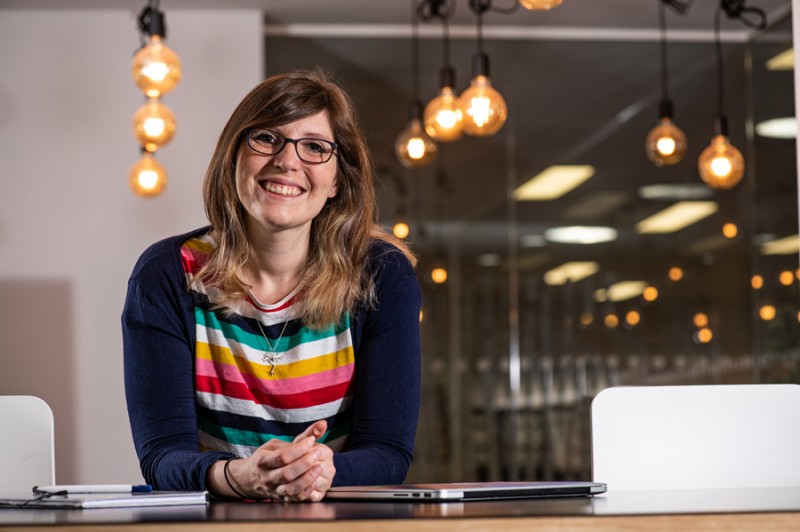
The 8th edition of BU’s annual research magazine – the Bournemouth Research Chronicle – has now been published. This year’s edition focuses on the work of our Early Career Researchers (ECRs). Read on to find out more about research being undertaken in the Faculty of Science & Technology.
Autism is a lifelong condition that affects an individual’s ability to communicate and relate to others, and how they experience the world around them. Research in autism covers a wide spectrum of issues, with gender differences currently a dominant point of conversation and investigation.
Numbers of people being diagnosed with autism are very unequal; research from 2017 suggests that boys are diagnosed at a rate three times higher than girls. It is now evident that autism presents quite differently and often more subtly in girls and women. With these findings now being brought to light, more and more women are being diagnosed with autism as adults. This makes it more important to understand why it is so difficult to detect autism in young girls, who are therefore more likely to miss out on support and interventions.
Dr Rachel Moseley is a Senior Lecturer in Psychology in the Faculty of Science & Technology. Her work centres on autism spectrum conditions, and has covered a range of sub-topics, including brain connectivity, cognition and language, and more recently, ageing, mental health, self-injury and suicidality. Female diagnosis of autism has been a strong element within her research, with a major focus on reasons why autism in women is underdiagnosed.
Findings from a study run by Dr Moseley and her colleague, Dr Julie Kirkby, suggest that the tools used for screening autism may play a part in the failure to detect autism in girls and women.
“It is really hard to know why there is such a disparity in diagnosis,” explains Dr Moseley. “It might be that autism does exist more in men, as men are more commonly diagnosed. On the other hand it might be that we just don’t recognise the symptoms in women. One paper I published looked at the screening tools that doctors use to check for red flags, and all of those instruments were designed through research studies with male participants.”
Women tend to be better at hiding their symptoms, something known as camouflaging. The likelihood of picking up ‘red flags’ in individuals who can mask their symptoms, when the screening measures are based upon surface behaviour, is slim and results in much later diagnosis.
“When people have very good cognitive abilities or high intelligence, they often learn to hide their symptoms,” says Dr Moseley, “The diagnostic instruments that we have tend to pick up surface behaviours. When observing autistic people, children or adults, medical professionals are expected to assess what is going on in front of them within the room.”
“Autistic women in particular are good at learning to hide their symptoms, as they are sometimes very good at picking up social rules and interactions. It might be costing them a great deal of mental energy to do this but on the surface you can’t detect that they are struggling.”
The later diagnosis of autism in women relates to two more recent aspects of Dr Moseley’s research into autism; mental health and autism within the ageing population. Due to later diagnosis, women often spend a lot longer not understanding why they behave and feel the way they do, resulting in a vulnerability to poor mental health.
“Very few studies are interested in autistic people as they age,” says Dr Moseley. “I am currently carrying out a study into ageing in autistic women, because women are a minority group in autism research. The majority of the research is based on men and boys. Autistic women are doubly marginalised as they age, because research into autism also nearly always focuses on children.”
Dr Moseley is also currently working on developing a better understanding of self-injury and suicidality in autistic people. This is a crucial goal given the very high rates of suicide in this population, which seem to be highest in autistic women. Dr Moseley’s forthcoming research on ageing in autistic women has indicated that many struggle with the changes in cognition, mental health and social communication associated with mid-life, and that these can make them feel too overwhelmed to carry on.
Between funding from the Department of Psychology and training workshops led by the Research Development & Support team, BU has provided support to Dr Moseley in her work, helping to ensure her research continues to make a positive impact in the wider community.
Her enthusiasm for working with external organisations, such as the National Autistic Society, and for sharing the results of her research with the autistic community has gained very positive feedback. This has highlighted to her the importance of the research she is conducting.
Dr Moseley says “I find it very important to share my work with the autistic community. I give talks at local support groups and I’ve recorded videos for my online participants, among other activities. I have received lots of lovely emails saying ‘this has changed my life’ and ‘I feel a lot better about myself now’. It means the world to me and gives me the encouragement I need to pursue my research.”
To find out more about the research of BU’s Early Career Researchers, visit www.bournemouth.ac.uk/brc.
If you would like a printed copy of the magazine, please email research@bournemouth.ac.uk.
 Autism screening tool may not pick up women with the condition
Autism screening tool may not pick up women with the condition Conversation article: Link between autism and eating disorders may be due to an inability to identify emotions
Conversation article: Link between autism and eating disorders may be due to an inability to identify emotions










 NIHR-funded research launches website
NIHR-funded research launches website Academics write for newspaper in Nepal
Academics write for newspaper in Nepal New paper published on disability in women & girls
New paper published on disability in women & girls Global Consortium for Public Health Research 2025
Global Consortium for Public Health Research 2025 World Drowning Prevention Day at BU
World Drowning Prevention Day at BU MSCA Postdoctoral Fellowships 2025 Call
MSCA Postdoctoral Fellowships 2025 Call ERC Advanced Grant 2025 Webinar
ERC Advanced Grant 2025 Webinar Horizon Europe Work Programme 2025 Published
Horizon Europe Work Programme 2025 Published Horizon Europe 2025 Work Programme pre-Published
Horizon Europe 2025 Work Programme pre-Published Update on UKRO services
Update on UKRO services European research project exploring use of ‘virtual twins’ to better manage metabolic associated fatty liver disease
European research project exploring use of ‘virtual twins’ to better manage metabolic associated fatty liver disease